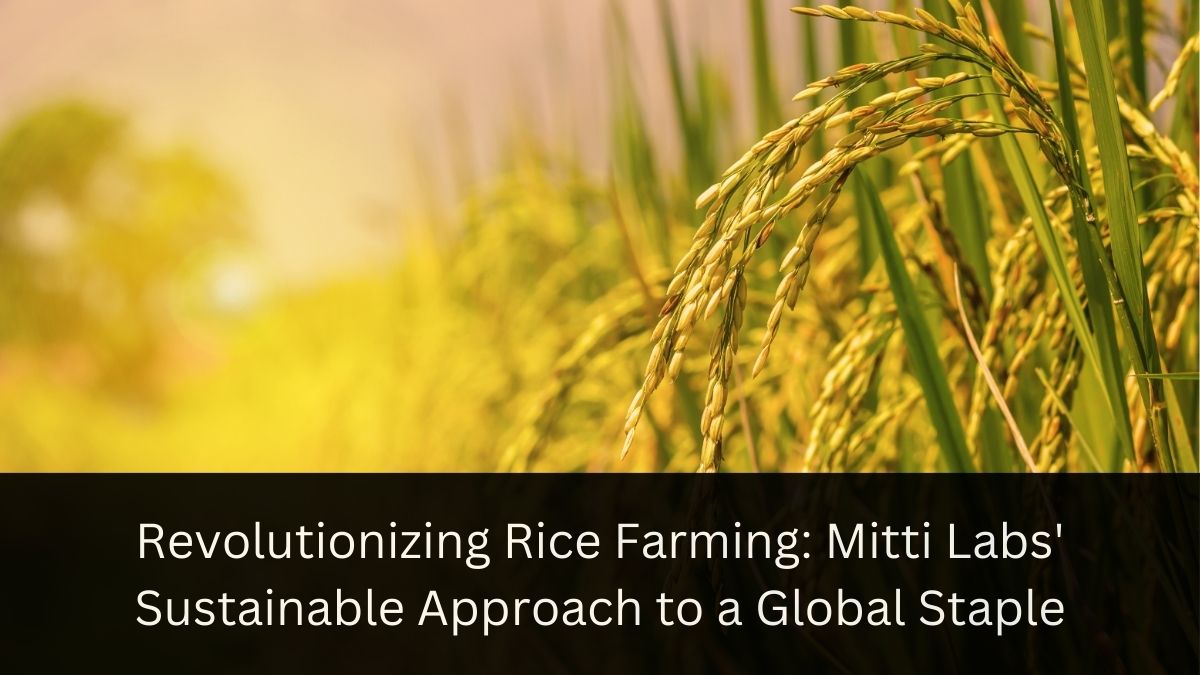Press Release
Revolutionizing Rice Farming: Mitti Labs’ Sustainable Approach to a Global Staple

In the realm of agriculture, few crops hold as much significance as rice. As the primary source of sustenance for over half the world’s population, rice cultivation has long been a cornerstone of global food security. However, traditional rice farming methods have come under scrutiny due to their substantial environmental impact. Enter Mitti Labs, a innovative startup that’s set to transform the rice industry with its cutting-edge approach to sustainable farming.
The Rice Conundrum: A Global Challenge
Rice, the humble grain that graces dinner tables across the globe, has a dark secret. Its cultivation is a major contributor to climate change, primarily due to methane emissions. As someone who grew up in a rice-consuming household, I never realized the environmental cost of my daily bowl of rice until I delved deeper into this topic.
Traditional rice farming methods are water-intensive and emit significant amounts of methane, a greenhouse gas nearly 30 times more potent than carbon dioxide in terms of atmospheric warming. To put this into perspective, rice production accounts for about half of all greenhouse gas emissions from croplands, including a staggering 30% of agricultural methane emissions.
Moreover, the water consumption in rice farming is astronomical. It takes approximately 3,000 liters of water to produce just one kilogram of rice. That’s equivalent to about 20 million liters per hectare of rice farmland! As global water scarcity becomes an increasingly pressing issue, these figures are simply unsustainable.
Mitti Labs: Sowing the Seeds of Change
Recognizing the urgent need for change in the rice industry, Harvard Business School graduates Xavier Laguarta and Devdut Dalal founded Mitti Labs in May 2022. Their mission? To revolutionize rice farming by significantly reducing both methane emissions and water consumption.
The Mitti Labs Approach
Mitti Labs employs a combination of high-tech solutions and on-ground implementations to achieve its ambitious goals. Their strategy includes:
- High-resolution satellite imagery: This technology allows for precise monitoring of rice fields, providing valuable data on water levels, soil moisture, and plant growth.
- On-ground gas chambers: These devices capture and measure methane and nitrous oxide emissions directly from the fields.
- Sustainable farming techniques: Mitti Labs works with farmers to implement practices such as improved water management and alternating wetting and drying cycles.
- Carbon credit system: By helping farmers adopt sustainable practices, Mitti Labs enables them to earn additional income through carbon credits.
Through these innovative methods, Mitti Labs aims to slash methane emissions by 50% and reduce water consumption by 30%. It’s an ambitious goal, but one that could have far-reaching implications for global food security and climate change mitigation.
From Theory to Practice: Mitti Labs in Action
Mitti Labs has hit the ground running, launching five projects across India in collaboration with organizations like the Syngenta Foundation, Dr. Reddy’s Foundation, and Spanish food processing company Ebro Foods. These projects cover an impressive 30,000 hectares and are projected to cut 120,000 metric tonnes of CO2e emissions.
The startup’s choice of India as its primary market is strategic. As the world’s second-largest rice producer, India’s agricultural practices have a significant global impact. However, Indian rice farmers are already feeling the effects of climate change, with declining water levels and increasing atmospheric methane.
By working with over 40,000 smallholder farmers, Mitti Labs isn’t just aiming for environmental impact. They’re also striving to improve farmers’ livelihoods, with the potential to increase annual incomes by up to 30% through carbon credit sales.
The Technology Behind the Transformation
At the heart of Mitti Labs’ approach is its sophisticated remote-sensing platform. This system utilizes high-resolution imagery from synthetic aperture radars (SARs) provided by SAOCOM and Umbra, combined with openly available satellite imagery. The result is a comprehensive understanding of farming practices, water levels, soil moisture, and plant growth.
On the ground, greenhouse gas chambers capture real-time data on methane and nitrous oxide emissions. This data is then processed in third-party labs, providing accurate calculations of emissions levels.
Challenges and Future Prospects
While Mitti Labs’ approach is promising, it’s not without its challenges. Convincing smallholder farmers to adopt new techniques can be difficult, as many are hesitant to deviate from traditional practices. To address this, Mitti Labs works closely with implementation partners to tailor their approach to local needs and preferences.
Looking ahead, Mitti Labs has ambitious expansion plans. With 10 more projects in the pipeline, the startup is eyeing entry into other major rice-producing countries like Bangladesh, Thailand, and Vietnam. However, India remains their primary focus, with Laguarta emphasizing their “strong passion to make an impact” in the country.
As we stand at the crossroads of food security and climate change, initiatives like Mitti Labs offer a glimmer of hope. Their approach demonstrates that it’s possible to maintain and even increase rice production while significantly reducing its environmental impact.
For consumers like myself, who’ve grown up with rice as a dietary staple, this presents an opportunity to reflect on our food choices and their broader implications. Supporting sustainable rice farming practices through our purchasing decisions can drive change on a larger scale.
As Mitti Labs continues to grow and expand its reach, it serves as a powerful reminder of the potential for innovation to address some of our most pressing global challenges. The future of rice farming – and indeed, global agriculture – may well be shaped by the seeds being sown today by startups like Mitti Labs.
In conclusion, as we face the dual challenges of feeding a growing global population and mitigating climate change, the work of Mitti Labs and similar initiatives becomes increasingly crucial. Their success could pave the way for a more sustainable and food-secure future – one grain of rice at a time.
